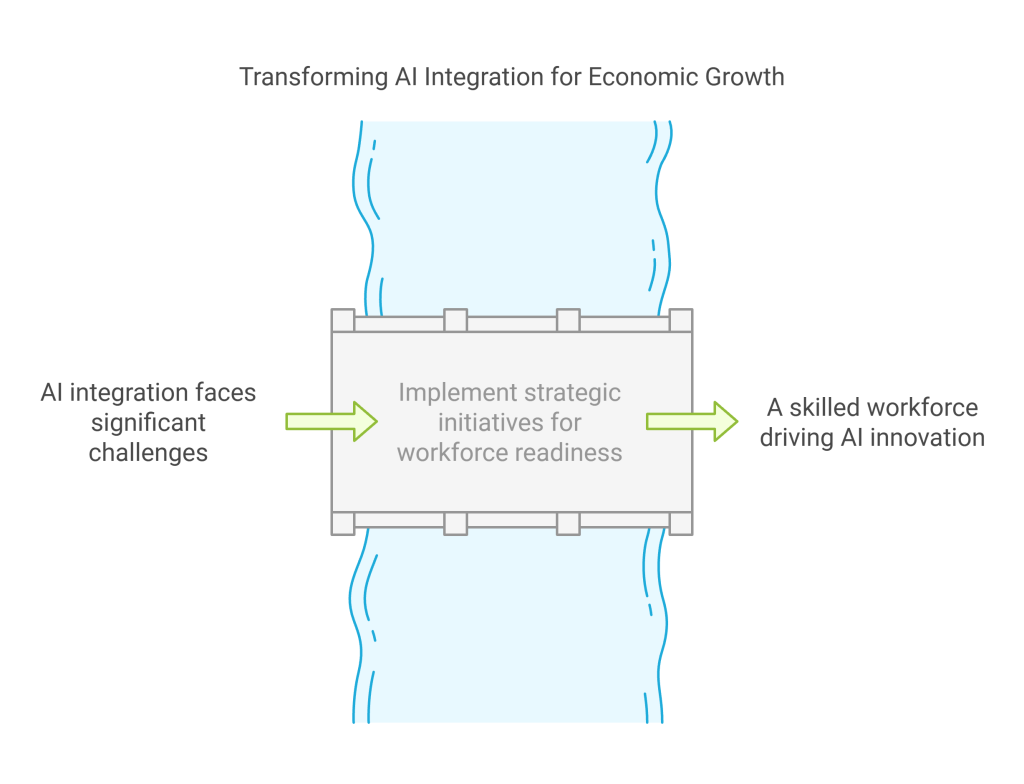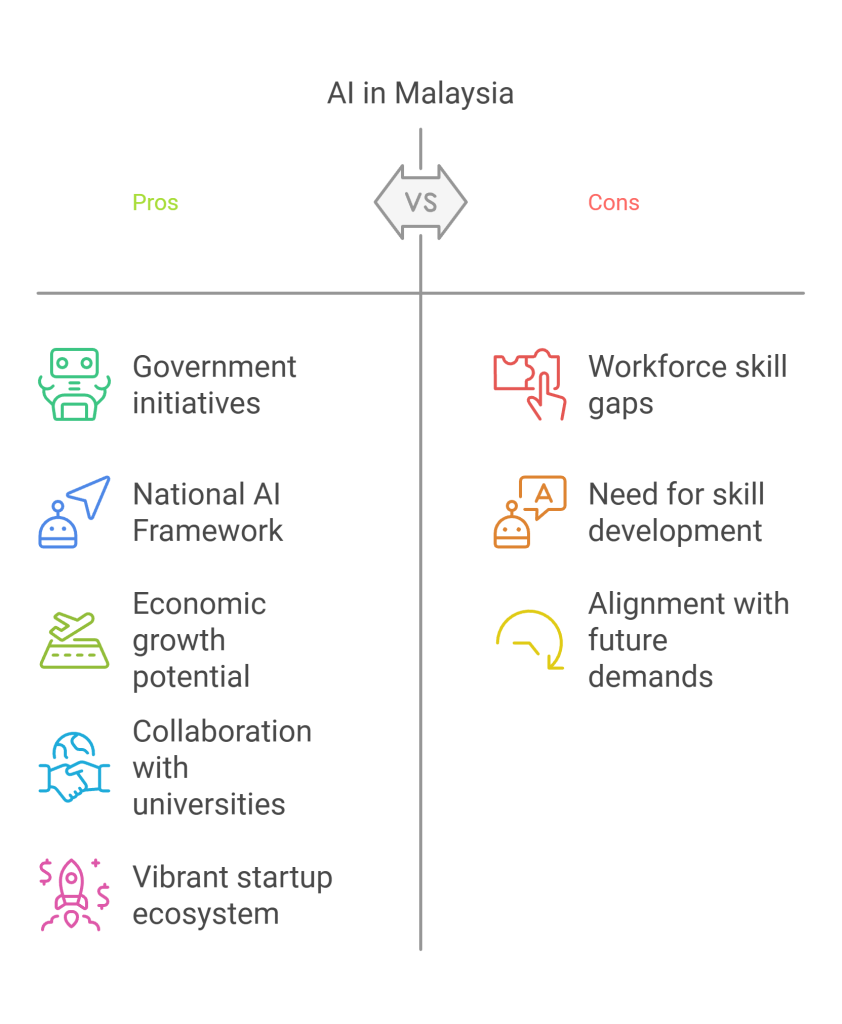Sri Rampai, Wangsa Maju
Kuala Lumpur, Malaysia
adyaakob@gmail.com
+60 102369037
Sri Rampai, Wangsa Maju
Kuala Lumpur, Malaysia
adyaakob@gmail.com
+60 102369037

The impact of artificial intelligence (AI) on Malaysia is rapidly evolving, as the government actively seeks to integrate AI technologies across various sectors, including healthcare, finance, agriculture, and education. With the launch of the National AI Framework in 2019, Malaysia has positioned itself as a regional leader in AI innovation, recognizing the technology’s potential to drive economic growth and improve public services.The government’s strategic initiatives aim to foster collaboration among universities, industry partners, and startups to enhance research and development in AI, ultimately unlocking significant productive capacity estimated at over $113 billion.Despite the positive advancements, the integration of AI in Malaysia is not without challenges. Concerns surrounding workforce readiness, ethical implications, data privacy, and security have emerged as key issues. The need for reskilling approximately 600,000 workers within the next few years underscores the urgency of adapting education and training programs to meet the demands of an AI-driven economy. Ethical concerns, particularly regarding data handling and algorithmic fairness, highlight the necessity for regulatory frameworks that prioritize transparency and accountability in AI applications.The Malaysian government is responding to these challenges by introducing comprehensive legislation aimed at facilitating data sharing while ensuring data protection and ethical AI deployment. Proposed bills, including amendments to the Personal Data Protection Act and the introduction of a cybersecurity framework, reflect a proactive approach to mitigate risks associated with AI technologies. Furthermore, the government is committed to promoting lifelong learning and enhancing educational systems to equip the workforce with necessary skills, thereby addressing potential job displacement due to automation.Overall, the intersection of AI with Malaysia’s socio-economic landscape presents a complex tapestry of opportunities and challenges. As the nation moves towards a more AI-integrated future, the government’s role in ensuring ethical practices, safeguarding data, and fostering a skilled workforce will be pivotal in harnessing AI’s full potential while mitigating associated risks.

The journey of artificial intelligence (AI) in Malaysia can be traced back to the government’s strategic initiatives aimed at enhancing national competitiveness and transforming various industries. In 2019, the Malaysian government launched the National AI Framework, which serves as a comprehensive roadmap for AI adoption across multiple sectors, including healthcare, agriculture, finance, and transportation. This framework reflects Malaysia’s commitment to positioning itself as a regional leader in AI technology and innovation. As AI technology began to gain traction globally, Malaysia recognized its potential to drive economic growth and improve public services. The integration of AI into public administration and economic development has been a focal point, as noted in studies highlighting the impact of digitalization on well-being in EU countries, which serves as a parallel context for Malaysia.Additionally, the government has been proactive in fostering collaboration between leading universities, such as Universiti Malaya and Universiti Teknologi Malaysia, and industry partners to advance AI research and development. Furthermore, Malaysia’s vibrant startup ecosystem has been instrumental in the proliferation of AI-driven solutions. The government has incentivized innovation through various initiatives aimed at encouraging small and medium-sized enterprises (SMEs) and startups to adopt AI technologies. This has been complemented by the release of reports, such as “The economic impact of generative AI: The future of work in Malaysia,” which emphasizes the significant productive capacity AI can unlock for the country, estimated at over $113 billion.Despite the rapid developments, challenges remain in ensuring that the workforce is equipped with the necessary skills to thrive in an AI-driven economy. The emphasis on skill development and innovation is critical, as articulated by industry leaders who advocate for recontextualizing skills to align with future technological demands. Overall, the historical context of AI in Malaysia is characterized by strategic government initiatives, a focus on research and collaboration, and a commitment to fostering a robust ecosystem for AI adoption.

Artificial Intelligence (AI) is making substantial inroads across various sectors in Malaysia, significantly transforming industries and enhancing the quality of life. This section highlights the current applications of AI in critical areas such as healthcare, finance, agriculture, and education.Healthcare
AI technologies are revolutionizing healthcare in Malaysia by improving diagnostic accuracy and patient care. For instance, AI-powered medical imaging systems assist radiologists in detecting diseases like cancer, facilitating early intervention and better outcomes for patients. The integration of AI during the COVID-19 pandemic illustrated its potential, as collaborations between companies like Huawei and the Malaysian Ministry of Health led to AI-driven diagnostic solutions that expedited COVID-19 diagnoses and informed public health strategies. Furthermore, platforms like DoctorOnCall provide virtual consultations, expanding access to healthcare services, particularly for those in remote areas.Finance
In the financial sector, AI is being utilized for fraud detection, risk assessment, and algorithmic trading, which enhances the efficiency of banking operations. AI-driven chatbots improve customer service by providing instant responses to inquiries, thereby streamlining the banking experience. These innovations contribute to reduced manual labor and errors, increasing overall productivity within the industry.Agriculture
The agricultural sector in Malaysia is also benefiting from AI advancements. AI technologies, including drones and sensors, help farmers optimize crop yields, monitor soil health, and detect pests and diseases more effectively. This application of AI is critical for enhancing food security and reducing dependency on imported agricultural products. By leveraging AI, farmers can make data-driven decisions that ultimately boost productivity and sustainability.Education
In the realm of education, AI is being integrated to personalize learning experiences for students. Adaptive learning platforms analyze individual performance and customize lessons based on students’ strengths and weaknesses, leading to improved educational outcomes. This approach not only fosters a more engaging learning environment but also prepares students for a future where digital literacy will be paramount.
While the impact of AI is predominantly positive, challenges remain, particularly in ensuring that traditional industries are not left behind. The government is tasked with providing support and resources to assist these sectors in adapting to the AI era. Looking ahead, AI is poised to become increasingly integral to everyday life in Malaysia, with the potential for smart cities and enhanced public services driving further transformation. The ongoing commitment from the government, alongside the efforts of educational institutions and startups, positions Malaysia to be a leader in AI innovation.
In recent years, sustainability, particularly in relation to Environmental, Social, and Governance (ESG) standards, has gained significant momentum in Malaysia. As noted by industry experts, the push for sustainability is heavily reliant on consumer demand; businesses are more likely to adapt sustainable practices when they see a strong consumer interest. This trend is particularly pronounced among Malaysian consumers, especially Generation Z, who are increasingly vocal about their expectations for transparency and ethical behavior from companies.
The Malaysian government has made concerted efforts to align with global sustainability goals through various initiatives, emphasizing the importance of ethical AI deployment and sustainable practices across industries. For instance, the government’s Budget 2025 outlines a significant focus on artificial intelligence (AI) applications that support sustainable development goals, particularly in sectors such as agriculture and energy management. These investments aim to optimize resource usage and reduce environmental impacts, underscoring a proactive approach towards achieving climate resilience.
AI technologies are expected to play a crucial role in advancing sustainable practices within Malaysia. For example, AI is being utilized to enhance decision-making in resource management and optimize agricultural practices, which contribute to reduced waste and improved efficiency. Additionally, AI-driven analytics enable businesses and government agencies to make better-informed decisions that prioritize environmental sustainability. The integration of AI into various sectors not only supports sustainable development but also aligns with the broader economic goals of transitioning to a high-income nation.
Despite these advancements, challenges remain, particularly in ensuring data privacy and security as AI technologies become more prevalent. The Malaysian government is addressing these concerns through regulatory frameworks like the Personal Data Protection Act (PDPA), which aims to safeguard personal data while promoting innovation in AI. As Malaysia continues to navigate these complexities, the emphasis on ESG compliance and sustainable practices will be critical for the nation’s economic and environmental future.
The Malaysian government is actively working to integrate artificial intelligence (AI) within various sectors while ensuring data protection and ethical considerations. On June 19, 2023, Economy Minister Rafizi Ramli announced plans to introduce the Omnibus Act in the Dewan Rakyat. This legislation aims to facilitate data sharing across government agencies through the National Utility Database (Pangkalan Data Utiliti Kebangsaan or Padu), which will serve as a centralized repository for unified data collection. The government intends to utilize AI across different agencies, but emphasizes that data sets must be harmonized to include all regions, including Sabah and Sarawak.To advance these initiatives, the Cabinet is preparing to present three key bills to Parliament: an amendment to the Personal Data Protection Act (PDPA), a new cybersecurity bill, and the Omnibus Data Protection Act. While the PDPA primarily addresses the private sector, the Omnibus Data Protection Act will focus on the public sector and facilitate data portability between government agencies. The proposed cybersecurity legislation will encompass a broader regulatory framework for cybersecurity matters nationwide.In addition to legislative efforts, the government acknowledges the importance of addressing ethical concerns surrounding AI deployment. It is crucial to prioritize transparency, fairness, and accountability in AI systems to mitigate potential negative impacts on the labor market. Recommendations from organizations like London-based Future Advocacy suggest that governments undertake detailed research to identify jobs at risk from automation and establish targeted strategies to support retraining efforts. Furthermore, the government aims to enhance educational systems to promote creativity and skills that are less susceptible to automation. Emphasis on lifelong learning is also a vital component of this strategy.Overall, the Malaysian government is committed to ensuring that the benefits of AI are maximized while minimizing risks through comprehensive regulatory frameworks and ethical guidelines.
The implementation of artificial intelligence (AI) in various sectors of the Malaysian economy presents several challenges and concerns that need to be addressed for effective integration and future-proofing of the workforce.Reskilling and Upskilling
One major challenge identified is the need for reskilling and upskilling of workers, particularly as approximately 600,000 workers across ten sectors will require such training in the next three to five years due to the rise of AI and digitalization. This highlights the urgency for the Higher Education Ministry to review and adjust the curriculum to better align with labor market demands, shifting from producing job seekers to job creators.Ethical Concerns
The ethical implications of AI usage, particularly in sectors such as healthcare, have raised significant concerns. Key issues include informed consent, safety and transparency, algorithmic fairness, and data privacy. Notably, there have been instances where patient data was shared without consent, leading to questions about the ethics of data handling in AI applications. Furthermore, the lack of transparency in how AI algorithms reach decisions can undermine trust among users, particularly in critical areas like healthcare where understanding the rationale behind decisions is vital for patient safety.Data Ownership and Security
Another significant challenge is the question of data ownership and security. There is ongoing debate regarding whether data should be owned by the government, healthcare institutions, or the patients themselves. This dilemma complicates the integration of data necessary for developing robust AI systems and can act as a barrier to the effective adoption of AI technologies. Additionally, concerns about data security, including the potential for cyberattacks and breaches of confidentiality, contribute to hesitance among stakeholders to embrace AI solutions.Workforce Readiness
The Malaysian government faces the challenge of preparing a workforce capable of adapting to the rapid changes brought about by AI technologies. There is a reported shortage of personnel with the necessary skills to implement and manage AI systems, which poses a barrier to successful integration. As industries evolve, the government must prioritize not only the technical training of workers but also foster a culture of continuous learning and adaptability.Bias and Fairness
Bias in AI systems remains a critical concern, as algorithms can inadvertently perpetuate inequalities based on biased training data. This has been evident in various studies demonstrating that AI systems have difficulty accurately recognizing individuals from diverse backgrounds, leading to disparities in outcomes. To address these concerns, it is essential for developers to implement frameworks that promote fairness and transparency throughout the AI development process, ensuring that systems are trained on diverse and representative data sets.
As Malaysia moves towards 2025, the integration of artificial intelligence (AI) into various sectors, particularly healthcare, is anticipated to reshape the landscape of public services and improve efficiency. The government’s allocation of RM45.3 billion for healthcare, representing a 9.8% increase from 2024, underscores its commitment to addressing existing challenges within the public health system. AI is increasingly viewed as a transformative tool that could potentially alleviate issues of inefficiency and inequity that plague the current system.The healthcare sector is poised for significant growth, with predictions indicating a continual rise in demand for both curative and preventive healthcare solutions. For the first half of 2023, Malaysia’s healthcare travel sector reported revenues close to MYR1 billion (approximately US$219 million), with expectations to reach MYR7 billion (US$1.5 billion) by the end of the year, resulting in an estimated economic impact of MYR30 billion (nearly US$6.5 billion). This growth trajectory suggests a robust integration of technology within the healthcare sector, where AI initiatives, such as the Skim Perubatan MADANI launched in 2024, are being implemented to enhance patient care and service delivery by matching patients with providers and tracking real-time data.Moreover, the emphasis on a digitally connected healthcare system aligns with the shifting demands of patients who seek more efficient services. This includes the establishment of multidisciplinary care teams and a seamless experience facilitated by digital tools. As the government invests heavily in healthcare digitalization, with RM2.6 billion allocated for technological infrastructure improvements across various sectors, the focus will likely be on enhancing AI applications that support better healthcare delivery and patient outcomes. In addition to healthcare, the democratization of AI and cloud computing across other sectors is expected to foster sector-specific adaptation and technological synergies, paving the way for enhanced decision-making and market dynamics.With these advancements, Malaysia stands on the cusp of a technological evolution that may redefine both public services and the everyday lives of its citizens, emphasizing the need for continual investment in innovation and accessibility.
Disclaimer: